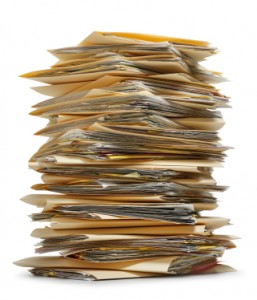 As a researcher, I most enjoy looking through collections of personal papers. For me, seeing what items still exist is just as interesting as finding the data they contain. I have gone through family papers that I was told were “junk” and found information that I would have never found elsewhere, and which only exists because someone thought it was important enough to keep. It was when pondering my family papers and the records I create in my own research that I began to think about future genealogists. Continue reading Taking the long view
As a researcher, I most enjoy looking through collections of personal papers. For me, seeing what items still exist is just as interesting as finding the data they contain. I have gone through family papers that I was told were “junk” and found information that I would have never found elsewhere, and which only exists because someone thought it was important enough to keep. It was when pondering my family papers and the records I create in my own research that I began to think about future genealogists. Continue reading Taking the long view
Title troubles

The recent death of the Dowager Duchess of Devonshire got me to thinking about the genealogical treatment of titles. Titles can be tricky, and many American genealogists – confronted with medieval British or European titles in their ancestry – prefer to ignore them or, conversely, string them all together and hope that the result is acceptable.
The same is true of the American press. At present, The New York Times behaves as though someone with a title doesn’t use it. In the Duchess’s obituary, the headline called her Deborah Cavendish – true enough, but Cavendish is hardly the name (or the rank) by which she was best known. Continue reading Title troubles
At last: a link to the Mayflower!
 Throughout my childhood and teenage years I was under the impression that my ancestors had traveled to Plymouth on the Mayflower. Being young and naive, I had no reason to question my parents’ long-held beliefs. Given that my grandfather, Henry Hornblower II (1917–1985), founded Plimoth Plantation in 1947, no one ever questioned my Mayflower lineage. And with a last name like Hornblower, who would? Continue reading At last: a link to the Mayflower!
Throughout my childhood and teenage years I was under the impression that my ancestors had traveled to Plymouth on the Mayflower. Being young and naive, I had no reason to question my parents’ long-held beliefs. Given that my grandfather, Henry Hornblower II (1917–1985), founded Plimoth Plantation in 1947, no one ever questioned my Mayflower lineage. And with a last name like Hornblower, who would? Continue reading At last: a link to the Mayflower!
Planning an ancestral trip
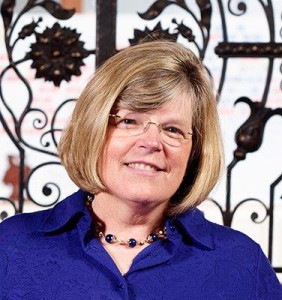 Last week, I was happily recalling my 2012 trip to Finland, specifically a visit to my ancestral village, Teuva. I had the great good luck to meet cousins there and see the land that my ancestors farmed – and even the foundation of the tiny house where my grandmother grew up. Continue reading Planning an ancestral trip
Last week, I was happily recalling my 2012 trip to Finland, specifically a visit to my ancestral village, Teuva. I had the great good luck to meet cousins there and see the land that my ancestors farmed – and even the foundation of the tiny house where my grandmother grew up. Continue reading Planning an ancestral trip
How I became a genealogist: Part Two
 I am the last woman in six generations of my umbilical line (which is as far back as I’ve been able to trace). My mother’s mother, Alice Mason Crane, for whom I was named (I was going to be Alice, too, but Gram didn’t want to be called “Big Alice”), inherited generations of family material from her ancestors and from her husband’s family. All of the Bibles, letters, photographs, and more ended up in her home in Natick, Massachusetts. After she lost her only son in World War II, she spent the next years sorting this material and typing it – with four carbon copies for her grandchildren (she had also trained as a secretary) – into a genealogy. Continue reading How I became a genealogist: Part Two
I am the last woman in six generations of my umbilical line (which is as far back as I’ve been able to trace). My mother’s mother, Alice Mason Crane, for whom I was named (I was going to be Alice, too, but Gram didn’t want to be called “Big Alice”), inherited generations of family material from her ancestors and from her husband’s family. All of the Bibles, letters, photographs, and more ended up in her home in Natick, Massachusetts. After she lost her only son in World War II, she spent the next years sorting this material and typing it – with four carbon copies for her grandchildren (she had also trained as a secretary) – into a genealogy. Continue reading How I became a genealogist: Part Two
Middlesex County probate records now online
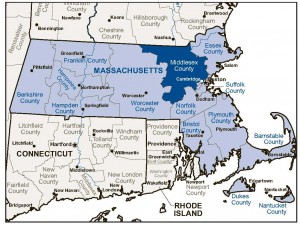
Middlesex County was created on 10 May 1643 as one of the original four counties of the Massachusetts Bay Colony. The other original counties were Essex, Suffolk, and a now extinct Norfolk – a name later reused for a different geographic region in the state.
At its founding, Middlesex County covered a broad swath of Massachusetts. The county was bordered to the north by New Hampshire, to the east by Essex County, to the south by Suffolk County, and to the west by New York – until Hampshire County was created in 1662. Continue reading Middlesex County probate records now online
The Boucher family reunion
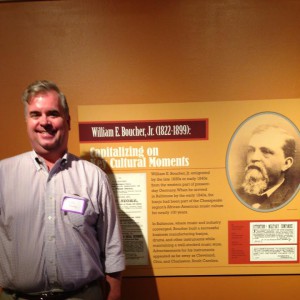 This past weekend, about twenty-five of my Boucher cousins gathered to tour the Baltimore Museum of Industry’s show, “Making Music: The Banjo in Baltimore and Beyond,” with its three curators. Our visit to the BMI likely marked the first large-scale reunion of the descendants of William Boucher Jr. (1822–1899) in many years – perhaps since the death of my great-great-grandmother (William’s widow) in 1923.
This past weekend, about twenty-five of my Boucher cousins gathered to tour the Baltimore Museum of Industry’s show, “Making Music: The Banjo in Baltimore and Beyond,” with its three curators. Our visit to the BMI likely marked the first large-scale reunion of the descendants of William Boucher Jr. (1822–1899) in many years – perhaps since the death of my great-great-grandmother (William’s widow) in 1923.
I don’t think my mother – William Boucher’s great-granddaughter – felt especially close to this part of her family. What interest in the Bouchers I heard expressed focused on exactly how we descended from François Boucher, the painter. When my mother was little, it was still permissible to say, vaguely, that we were François’ descendants; nowadays, with so many (once buried) resources available to us, the story doesn’t really stand up to much scrutiny. Continue reading The Boucher family reunion
“Very impertinent”: Elizabeth Chandler of Woodstock
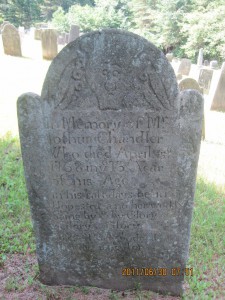
Sometimes, the most interesting stories are found when you weren’t looking for them, as in the following example. I was searching for a simple marriage record in the town of Woodstock, Connecticut. While I eventually found the record I was seeking, what I noticed immediately above that record was a series of intriguing entries. The records read as follows[1]:
1. “Chandler, Elizabeth, was requested Nov. 11, 1743 to make a public confession”
2. “Her letter of conf. was read at ch. meeting Nov. 25, 1743 and considered ‘very impertinent’” Continue reading “Very impertinent”: Elizabeth Chandler of Woodstock
Sprechen Sie Deutsch?
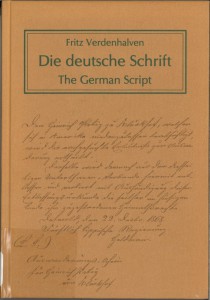
An article linked from The Weekly Genealogist had me thinking about how to conduct research in unfamiliar languages. I will soon receive eight microfilm reels containing German Catholic church records. The contents will be recorded in Latin, but key information could appear in German script. Sometimes it melds together to the point I’ve completely forgotten which language I am reading.
For the most part, church, and vital records adhere to a template, so even those of us who do not know the language can parse out facts pertinent to our ancestors. The key to accomplishing this feat lies in referring to guides to the language and/or records.
To help, Rhonda McClure has created a guide to German research for us. Some institutions post online translation tips and vocabulary lists. Brigham Young University offers some great script tutorials, and the FamilySearch wiki features a variety of language aids. Continue reading Sprechen Sie Deutsch?
How I became a genealogist: Part One
 I got a chuckle out of Bob Anderson’s preface to Elements of Genealogical Analysis, where he described his path to genealogy through military intelligence and molecular biology. It reminded me of the days back in the 80s and 90s when we belonged to a small group of Boston-area genealogists who gathered every month for a pot-luck dinner and genealogy talk. The dinners were the brainchild of Ann Lainhart and, although informal, the group at one point included the editors of the Register, The American Genealogist, and The Mayflower Descendant. When you have the opportunity to sit and listen to the likes of Jane Fiske, Ruth Ann Sherman, Bob Anderson, David Dearborn, Melinde and George Sanborn, and Roger Joslyn to name a few, one cannot help but learn genealogy. Continue reading How I became a genealogist: Part One
I got a chuckle out of Bob Anderson’s preface to Elements of Genealogical Analysis, where he described his path to genealogy through military intelligence and molecular biology. It reminded me of the days back in the 80s and 90s when we belonged to a small group of Boston-area genealogists who gathered every month for a pot-luck dinner and genealogy talk. The dinners were the brainchild of Ann Lainhart and, although informal, the group at one point included the editors of the Register, The American Genealogist, and The Mayflower Descendant. When you have the opportunity to sit and listen to the likes of Jane Fiske, Ruth Ann Sherman, Bob Anderson, David Dearborn, Melinde and George Sanborn, and Roger Joslyn to name a few, one cannot help but learn genealogy. Continue reading How I became a genealogist: Part One